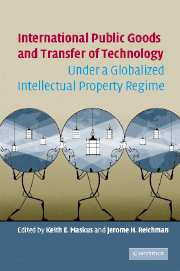Book contents
- Frontmatter
- Contents
- List of contributors
- Preface
- PART I International Provision of Public Goods under a Globalized Intellectual Property Regime
- PART II Innovation and Technology Transfer in a Protectionist Environment
- PART III Sectoral Issues: Essential Medicines and Traditional Knowledge
- 15 Managing the Hydra: The Herculean Task of Ensuring Access to Essential Medicines
- 16 Theory and Implementation of Differential Pricing for Pharmaceuticals
- 17 Increasing R&D Incentives for Neglected Diseases: Lessons from the Orphan Drug Act
- Comment: Access to Essential Medicines – Promoting Human Rights Over Free Trade and Intellectual Property Claims
- 18 Legal and Economic Aspects of Traditional Knowledge
- 19 Saving the Village: Conserving Jurisprudential Diversity in the International Protection of Traditional Knowledge
- 20 Legal Perspectives on Traditional Knowledge: The Case for Intellectual Property Protection
- Comment: Traditional Knowledge, Folklore and the Case for Benign Neglect
- 21 Protecting Cultural Industries to Promote Cultural Diversity: Dilemmas for International Policymaking Posed by the Recognition of Traditional Knowledge
- PART IV Reform and Regulation Issues
- Index
18 - Legal and Economic Aspects of Traditional Knowledge
Published online by Cambridge University Press: 05 May 2010
- Frontmatter
- Contents
- List of contributors
- Preface
- PART I International Provision of Public Goods under a Globalized Intellectual Property Regime
- PART II Innovation and Technology Transfer in a Protectionist Environment
- PART III Sectoral Issues: Essential Medicines and Traditional Knowledge
- 15 Managing the Hydra: The Herculean Task of Ensuring Access to Essential Medicines
- 16 Theory and Implementation of Differential Pricing for Pharmaceuticals
- 17 Increasing R&D Incentives for Neglected Diseases: Lessons from the Orphan Drug Act
- Comment: Access to Essential Medicines – Promoting Human Rights Over Free Trade and Intellectual Property Claims
- 18 Legal and Economic Aspects of Traditional Knowledge
- 19 Saving the Village: Conserving Jurisprudential Diversity in the International Protection of Traditional Knowledge
- 20 Legal Perspectives on Traditional Knowledge: The Case for Intellectual Property Protection
- Comment: Traditional Knowledge, Folklore and the Case for Benign Neglect
- 21 Protecting Cultural Industries to Promote Cultural Diversity: Dilemmas for International Policymaking Posed by the Recognition of Traditional Knowledge
- PART IV Reform and Regulation Issues
- Index
Summary
Introduction
Traditional knowledge (TK) and its relationship to the formal IPR system has emerged as a mainstream issue in international negotiations on the conservation of biological diversity, international trade, and intellectual property rights. In the past few years, high-level discussions on the subject have been taking place at the World Trade Organization (WTO), the Conference of the Parties to the Convention on Biological Diversity (CBD), and at the World Intellectual Property Organization (WIPO), which has established an Intergovernmental Committee on Intellectual Property and Genetic Resources, Traditional Knowledge and Folklore (IGC). Several developing country governments in these forums have adopted the view that TK needs to be protected legally, and they have criticised the formal IPR system in its present form for not only failing to provide adequate protection for TK, but also for legitimising its misappropriation.
Solutions to the protection of traditional knowledge under intellectual property law may be sought in the form of “positive protection” or “defensive protection.” Positive protection refers to the acquisition by the TK holders themselves of an IPR, such as a patent or an alternative right provided by a sui generis system. Defensive protection refers to provisions adopted in the law or by the regulatory authorities to prevent IPR claims to knowledge, to cultural expression, or to a given product being granted to unauthorised persons or organisations. The distinction is somewhat artificial in actual practice, but is nonetheless useful conceptually, and is adopted in this chapter.
- Type
- Chapter
- Information
- International Public Goods and Transfer of Technology Under a Globalized Intellectual Property Regime , pp. 493 - 520Publisher: Cambridge University PressPrint publication year: 2005
- 4
- Cited by



